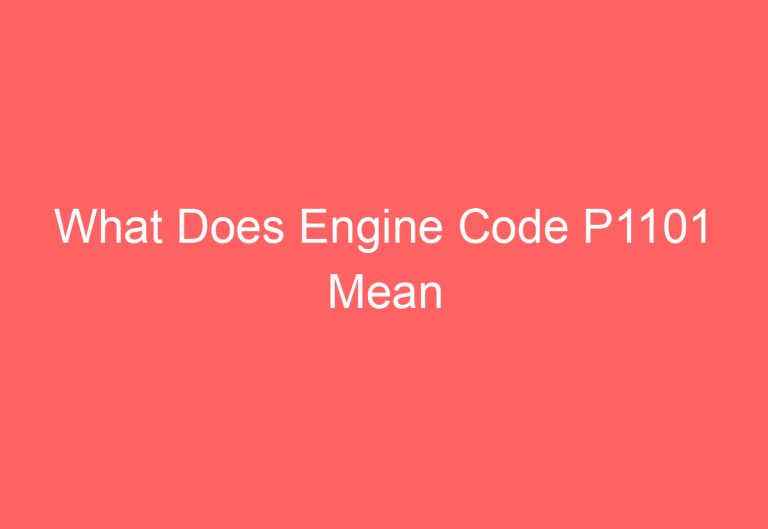What Causes Engine Misfire Code
Engine misfire codes are caused by a number of factors, including
A lack of fuel to the engine
A lack of air to the engine
A problem with the spark plugs
A problem with the ignition coils
A problem with the camshaft position sensor
A problem with the crankshaft position sensor
These are just a few of the possible causes of engine misfire codes. If you are experiencing an engine misfire, it is important to have your vehicle diagnosed by a qualified technician to determine the root cause of the problem.
So What Causes Engine Misfire Code?
Engine misfire codes:
are caused by a variety of factors, including:
Spark plugs:
Worn or damaged spark plugs can cause misfires.
Coil packs:
Faulty coil packs can also cause misfires.
Fuel injectors:
Clogged or dirty fuel injectors can cause misfires.
Air intake:
A restricted air intake can cause misfires.
Engine timing:
Improper engine timing can cause misfires.
Valvetrain:
Worn or damaged valvetrain components can cause misfires.
What Causes Engine Misfire Code?
An engine misfire occurs when one or more of your engine’s cylinders fails to fire properly. This can cause a number of problems, including decreased fuel economy, decreased power, and increased emissions. There are a number of different things that can cause an engine misfire, including:
Common Causes of Engine Misfire
Spark plugs:
Spark plugs are responsible for igniting the air-fuel mixture in your engine’s cylinders. If a spark plug is faulty, it can cause the cylinder to misfire.
Coil packs:
Coil packs provide the high voltage needed to fire the spark plugs. If a coil pack is faulty, it can cause the cylinder to misfire.
Fuel injectors:
Fuel injectors deliver fuel to the engine’s cylinders. If a fuel injector is faulty, it can cause the cylinder to misfire.
Cylinder compression:
Cylinder compression is the pressure that is created inside the cylinder when the piston is at top dead center. If cylinder compression is low, it can cause the cylinder to misfire.
Valve timing:
Valve timing refers to the timing of the opening and closing of the valves in your engine. If valve timing is incorrect, it can cause the cylinder to misfire.
Engine timing belt:
The engine timing belt synchronizes the rotation of the camshaft and crankshaft. If the engine timing belt is damaged or broken, it can cause the cylinder to misfire.
Mass air flow sensor:
The mass air flow sensor measures the amount of air flowing into the engine. If the mass air flow sensor is faulty, it can cause the engine to misfire.
Engine control module (ECM):
The engine control module (ECM) is the computer that controls the engine’s operation. If the ECM is faulty, it can cause the engine to misfire.
Symptoms of Engine Misfire
There are a number of symptoms that can indicate that your engine is misfiring, including:
Rough idle
Engine hesitation
Reduced power
Increased emissions
Check engine light on
If you notice any of these symptoms, it is important to have your vehicle inspected by a qualified mechanic as soon as possible.
Diagnosing Engine Misfire
Diagnosing an engine misfire can be a complex process, but there are a few things that your mechanic can do to narrow down the cause of the problem. These include:
Visual inspection:
Your mechanic will visually inspect your engine for any signs of damage or wear.
OBD II scan:
Your mechanic will use an OBD II scanner to read the codes stored in your vehicle’s computer. These codes can help identify the specific problem that is causing the misfire.
Compression test:
Your mechanic will perform a compression test to check the cylinder compression. This test can help identify any cylinders that are misfiring.
Spark plug test:
Your mechanic will remove the spark plugs and visually inspect them for damage or wear. They will also test the spark plugs with a spark plug tester to check for proper spark.
Coil pack test:
Your mechanic will test the coil packs to check for proper operation.
Fuel injector test:
Your mechanic will test the fuel injectors to check for proper operation.
Cylinder leakdown test:
Your mechanic will perform a cylinder leakdown test to check for any leaks in the cylinder.
Valve timing test:
Your mechanic will perform a valve timing test to check the timing of the valves.
Engine timing belt test:
Your mechanic will check the engine timing belt for damage or wear.
Mass air flow sensor test:
Your mechanic will test the mass air flow sensor to check for proper operation.
Engine control module (ECM) test:
Your mechanic will test the ECM to check for proper operation.
Treatment for Engine Misfire
The treatment for an engine misfire will depend on the specific cause of the problem. Some of the common treatments for engine misfire include:
Replacing spark plugs:
If the spark plugs are faulty, they will need to be replaced.
Replacing coil packs:
If the coil packs are faulty, they will need to be replaced.
Replacing fuel injectors:
If the fuel injectors are faulty, they will need to be replaced.
Reconditioning the cylinder heads:
If the cylinder heads are damaged, they may need to be reconditioned or replaced.
Adjusting valve timing:
If the valve timing is incorrect, it will need to be adjusted.
Replacing
Also Read: What Code Does Unreal Engine 4 Use

![How To Write Code In Unreal Engine 4 [Discovered]](https://automotiveglory.com/wp-content/uploads/2024/05/how-to-write-code-in-unreal-engine-4-discovered_6112-768x529.jpg)

![Where Is The Engine Code On A Bmw [Defined]](https://automotiveglory.com/wp-content/uploads/2024/05/where-is-the-engine-code-on-a-bmw-defined_6132-768x529.jpg)

![Can Engine Code P0335 Trigger Code P0100 [Uncovered]](https://automotiveglory.com/wp-content/uploads/2024/05/can-engine-code-p0335-trigger-code-p0100-uncovered_6176-768x529.jpg)
